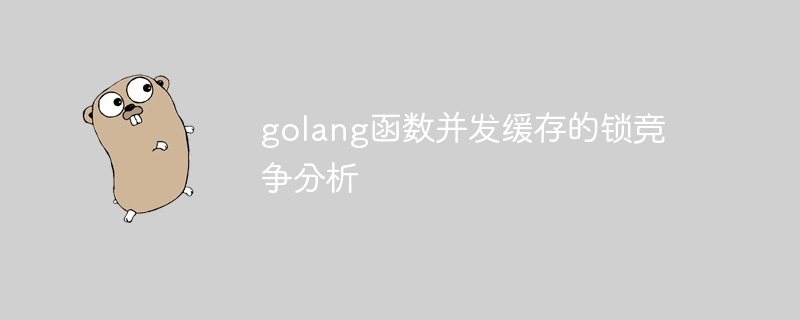Home >Backend Development >Golang >Lock competition analysis of golang function concurrent cache
Lock competition analysis of golang function concurrent cache
- WBOYWBOYWBOYWBOYWBOYWBOYWBOYWBOYWBOYWBOYWBOYWBOYWBOriginal
- 2024-05-01 18:21:011158browse
There is a lock competition problem in the function concurrent cache in Go, which leads to performance degradation and even program crash. Lock contention can be analyzed using pprof or go tool trace. One solution is to add a lock in the cache function to ensure that only one goroutine accesses the cache at a time.

Lock competition analysis of function concurrent cache in Go
The problem
is in In Go, we often use function caching to improve performance. However, cached lock contention can become a problem when functions are called concurrently.
Potential Impact
Lock competition may lead to performance degradation, deadlock, or even program crash.
Practical case
Consider the following function cache example:
// cache 是一个映射表,key 是函数参数,value 是函数返回值
var cache = make(map[string]interface{})
// getCacheValue 获取缓存值
func getCacheValue(key string) interface{} {
value, ok := cache[key]
if !ok {
value = calculateValue(key)
cache[key] = value
}
return value
}
func calculateValue(key string) interface{} {
// 模拟一个耗时的计算过程
time.Sleep(time.Second)
return key
}
// main 函数并发调用 getCacheValue
func main() {
// 创建多个 goroutine 并发调用 getCacheValue
// 省略并发代码示例
}How lock contention occurs
getCacheValue The function does not lock the cache, so multiple goroutines can access the cache at the same time. Lock contention may occur when concurrent calls attempt to access the cache at the same time.
Analysis tools
We can use tools such as pprof and go tool trace to analyze lock competition.
pprof
Use pprof to analyze lock competition:
- Run with
-mutexprofileFlag program:go run -mutexprofile=mutex.prof main.go - Use
pprofto view the lock competition report:go tool pprof -mutex mutex .prof
go tool trace
Usego tool trace to analyze lock competition:
- Record program execution traces:
go tool trace -cpuprofile cpu.prof -mutemuteprofile mutex.prof main.go - View lock competition report:
go tool trace mutex mutex.prof
Solution
One way to solve cache lock competition is to lock the cache in the getCacheValue function :
func getCacheValue(key string) interface{} {
lock.Lock()
defer lock.Unlock()
value, ok := cache[key]
if !ok {
value = calculateValue(key)
cache[key] = value
}
return value
}This method ensures that only one goroutine can access the cache at a time, thus avoiding lock contention.
The above is the detailed content of Lock competition analysis of golang function concurrent cache. For more information, please follow other related articles on the PHP Chinese website!

